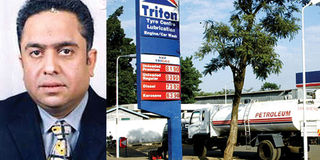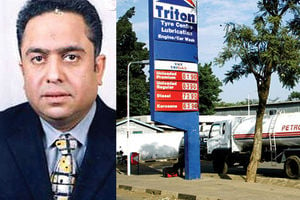
Tycoon Yagnesh Devani. He is the architect of the Sh7.6 billion Triton oil scandal.
Shortly after the 2008 post-election violence, five oil tankers, SPT Navigator, Elka Aristotle, Chem Marigold, Artic Blizzard, and Kara Sea queued to offload cargo at the Mombasa port. A scandal was in the making.
For the last 16 years, Yagnesh Devani, the man implicated in the saga, engaged the British legal system in a lengthy fight over his extradition – which allowed other players in the oil deal to vanish.
When Devani registered Triton Petroleum Limited in 2000, he hoped to cash in on an open tender system (OTS), which had been introduced to help small indigenous oil companies access fairly priced crude oil for processing at the now obsolete refinery in Mombasa. Under the OTS, which was operated by the Ministry of Energy, the oil marketers competed to import refined products and crude oil for the whole industry. In most cases, the import was guaranteed by financiers under a Collateral Financing Agreement (CFA).
But how Devani managed to offload more oil than he brought and sell the Sh7.6 billion cargo that he had brought – some 72,284 metric tonnes of crude oil – without the authority of his financiers, has always baffled investigators. Those who authorised the release of the fuel from the Kenya Pipeline Company have never been brought to book as their kingpin vanished to the United Kingdom. Criminal Investigation Director Simon Gatiba Karanja, who had relentlessly pursued Devani, collapsed and died of “breathing complications” at his Thima home, thus slowing down the hunt for the Triton masterminds. Devani’s financiers, who included KCB and PTA banks, Fortis Bank of Netherlands, Glencore Energy UK Limited and Emirates National Oil Corporation (ENOC) of Singapore, were left with paperwork and empty coffers. Within the oil industry, apart from its political might, Triton was a small player with less than one per cent of the market share.
The Triton oil scandal, as it was known, was the work of insiders within the Ministry of Energy, then headed by Kiraitu Murungi, and the Kenya Pipeline Company, then under George Okungu. How much the senior officials knew about Triton will be revealed when the Devani case starts and the witnesses retrieve their 16-year memory. They all blamed some junior officers who were either never found or prosecuted. The Energy PS Patrick Nyoike said he was kept in the dark over Triton; his minister, Murungi, said it was “a serious crime of dishonesty and fraud”. The ministry looked reluctant to pursue the matter, and the financiers were left to pursue a man on the run and a company with minimal assets. By the time it went under, Triton owed financiers Sh7.6 billion among them, KCB (owed Sh1.85 billion), Glencore (Sh2.3 billion), Fortis of France (Sh906 million), and Emirates National Oil Company (Sh2.5 billion).
Triton was well connected in the Narc political system. KPC managers allowed the company to hold speculative stock in the storage facilities to the detriment of other users. There were complaints from other industry players that Triton occupied half of the space available at the KPC facilities at times. It would buy crude oil when prices were low and wait to offload when the prices climbed.
As the Court of Appeal later found, Glencore Energy, one of the leading financiers, was not an innocent player. Glencore wanted to enter the Kenyan oil sector using Triton’s license. After all, Triton had no capital to buy crude oil. After its deal with Triton ended in smoke, the company attempted to use the court’s platform to seek assistance. There was little help as the Court of Appeal invoked the ex dolo malo no ovitur actio principle, which generally states that courts cannot assist those seeking justice after breaking the law. The Court of Appeal criticised a High Court ruling that awarded Glencore Sh4 billion to cover its loss. The appellate judges said: “No court ought to enforce an illegal contract where the illegality is brought to its notice and if the person invoking the aid of the court is himself implicated in the illegality.”
It will be interesting to see whether Glencore will seek to extricate itself from the Triton mess. The essence of the case in Nairobi against Devani is that “he dishonestly procured or conspired with others to procure the transfer oil to Total” with the knowledge and intention that this would result in his financiers losing security over the product. While the cargo was not supposed to be released without the authority of the financiers, some officials at the Ministry of Energy and Kenya Pipeline approved the release. The other faces behind Triton have always remained secret and had wished that Devani stayed in Europe – with the scandal and the story.
Triton and Glencore is the tale of two companies that fraudulently wanted to circumvent laws in Kenya and corruptly do business. Either they conspired to steal oil, or one conned the other. The depth of this conspiracy and the truth might be unveiled in court. It was a complex game, and as the Court of Appeal found, Glencore had hatched an elaborate scheme to use Triton as a “front, cover and cloak” to carry out illegal oil trading in Kenya without a license – or what the judges described as a “flagrant illegality”. The question is: How many officials at the Ministry of Energy and Kenya Pipeline knew about this scheme?
Compared to Triton, Glencore was a giant multibillion-dollar empire founded by the late Marc Rich, an international commodities trader and hedge-fund manager. Marc Rich had a background of tax evasion and was once indicted in the United States on federal charges of $48 million in tax evasion, the largest in US history. His company was also accused of making controversial oil deals with Iran during the Iran hostage crisis. Like Devani, Marc Rich also fled the US to Switzerland. Those who were in a position to explain what happened seemed tongue-tied and could only agree they had been duped. They included Murungi, Okungu, and Nyoike. A chance to tell their story, if called as State witnesses, has now come.
For his part, Okungu, weeks after he was fired over the Triton scandal, was charged not over the release of processed petroleum to Devani but for selling some Kenya Pipeline houses worth more than Sh60 million. In that way, the story of Triton seemed to have died, and High Court Judge George Odunga, in February 2014, stopped this Okungu case, arguing that he was the victim of “selective” justice and “discrimination”. The Devani trial might reveal more than we know about KPC, where oil was siphoned and sold to the market without proper accounting, and the Open Tender System and how it was prone to abuse.
[email protected] ; @johnkamau






